Chapter 1: Emma’s Bad Habit
Emma was a young girl who lived in a big city with her father and mother. They loved her very much, but they had one problem with her: she never said “thank you” to anyone. Emma was so used to getting everything she wanted that she took it for granted and never showed any gratitude or appreciation.

Emma’s bad habit of not saying “thank you” made her seem rude and unkind to others. For example, when her grandmother came to visit and brought her a lovely teddy bear, Emma snatched it from her hands and ran to her room without saying a word. Her grandmother felt hurt and sad, but Emma did not care.
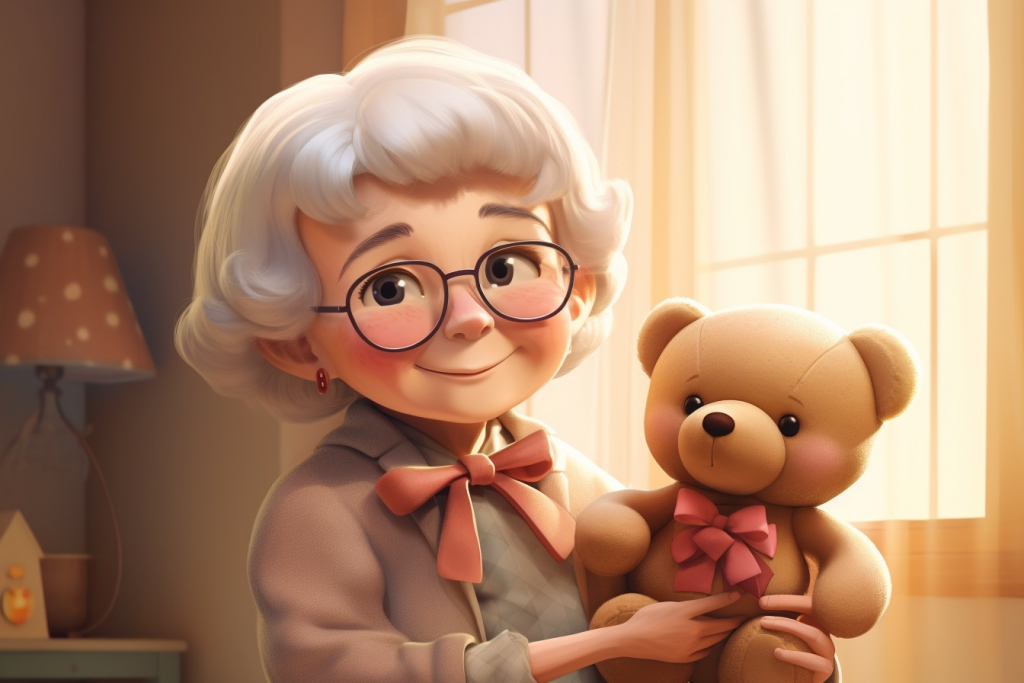
Another time, when her teacher praised her for doing well on a test, Emma just shrugged and said, “It was easy.” Her teacher felt disappointed and annoyed, but Emma did not notice.
And once, when her best friend gave her a beautiful bracelet for her birthday, Emma looked at it and said, “Is this all you got me?” Her friend felt angry and hurt, but Emma did not apologize.

Emma’s bad habit of not saying “thank you” made her lose many friends and opportunities. People did not like to help her or give her gifts anymore, because they felt that she did not appreciate them. Emma did not realize how much she was missing out by being ungrateful and rude.
One day, Emma’s class went on a school trip to a nearby forest. They were going to camp there for two weeks and learn about nature. Emma was excited, because she loved camping and playing outdoors. She packed her backpack with all the things she needed, and boarded the bus with her classmates.
When they arrived at the forest, they set up their tents and started to explore the surroundings. Emma joined a group of kids who were playing soccer in a clearing. She loved soccer, and she was very good at it. She scored many goals and made fun of the other team. She did not say “thank you” when someone passed her the ball, or “sorry” when she fouled someone.
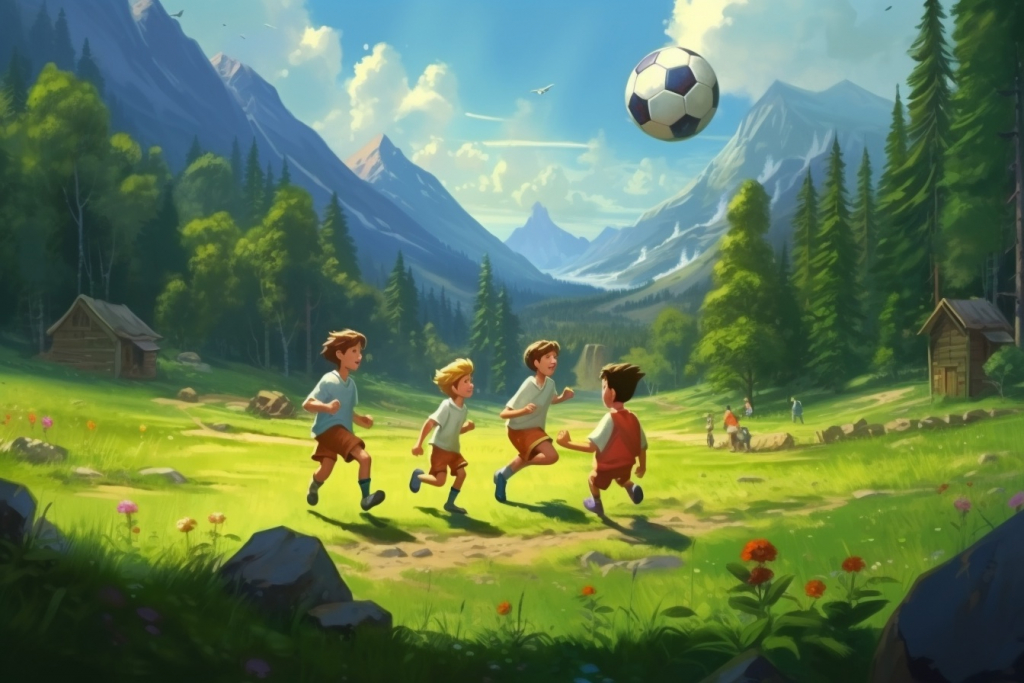
During one of the games, Emma kicked the ball so hard that it flew out of the clearing and into the woods. She ran after it, hoping to find it before anyone else did. She did not tell anyone where she was going, or ask anyone to come with her.
She followed the ball’s trail through the trees, until she reached a small hut in the middle of the forest. As she approached, she saw the old woman standing at the door of the hut, holding the ball in her hand.
“Hello there, little girl,” the old woman said. “Is this what you’re looking for?”

Without waiting for a response, the old woman handed Emma the ball. Instead of thanking her, Emma simply snatched the ball from the woman’s hand, saying, “That’s mine.” She turned to leave when the enticing aroma of freshly baked bread wafted to her nostrils. She noticed a loaf of bread cooling on a table just outside the hut.
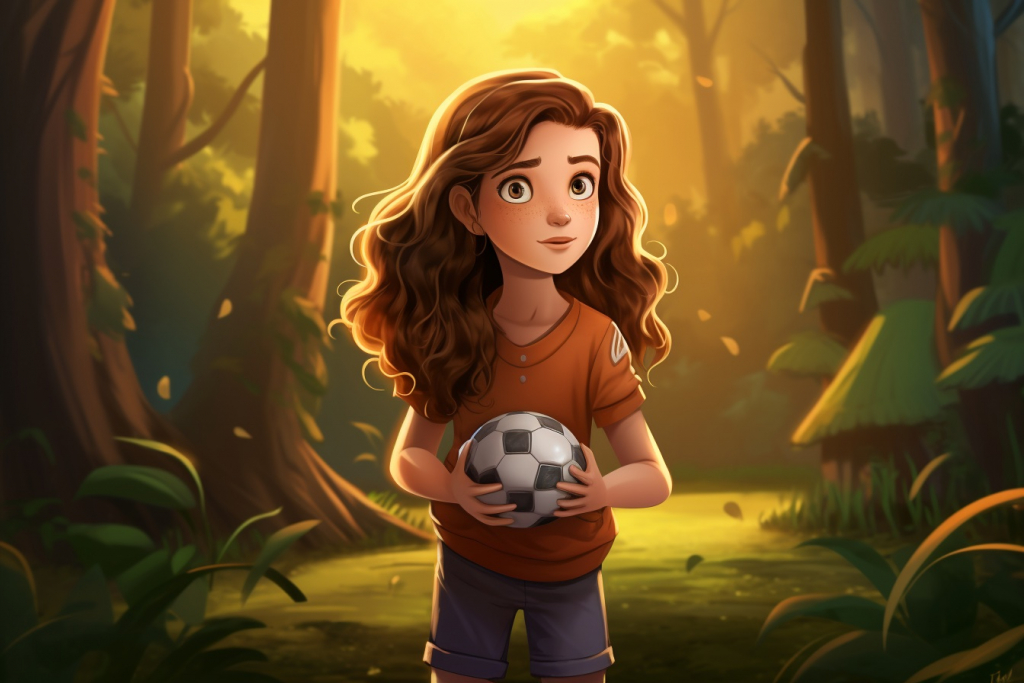
Stopping in her tracks, Emma pointed at the bread and said, “Can I have some of that bread?”

The old woman closed her eyes sadly, as she immediately perceived the nature of Emma’s character. “Of course, dear,” she replied with a hint of sadness in her voice, “you can take it, but with a spell that would teach you, Emma, a lesson…” she said quietly to herself.
Without a word of thanks, Emma snatched a piece of the bread and took a big bite as she walked away. Little did she know that this wasn’t any ordinary bread; it was infused with the old woman’s Gratitude Spell.
Chapter 2: Mystery of the Forest
After leaving the old woman’s hut, Emma clutched the ball under one arm and hurried back to the camp, still chewing on the magical bread. She could hear the distant laughter and chatter of her classmates, and as she emerged from the trees, a few kids noticed her return. “There she is!” shouted Jake, one of her classmates. “Thought you got lost!” Emma, slightly out of breath from her run, held up the ball triumphantly. “Got it!” she announced. Liam, another friend, clapped her on the back. “Good job, Em! We were worried. Thanks for fetching it.” “It was no big deal,” she said dismissively.
That evening, the entire class gathered around a roaring campfire. Flames danced high, casting a warm glow on the faces of the children as they sang songs and shared stories. As they roasted marshmallows and sausages, Emma’s roasting stick suddenly caught fire. The flames consumed her treat, and she stared in dismay. Without hesitation, Oliver, a boy from her class, crafted a new stick and handed it to her. “Here, use this one,” he said with a kind smile. Emma took the stick, her face still showing her annoyance over the burned treat. She didn’t utter a word of thanks, simply threading a new marshmallow onto the stick and holding it over the flames.
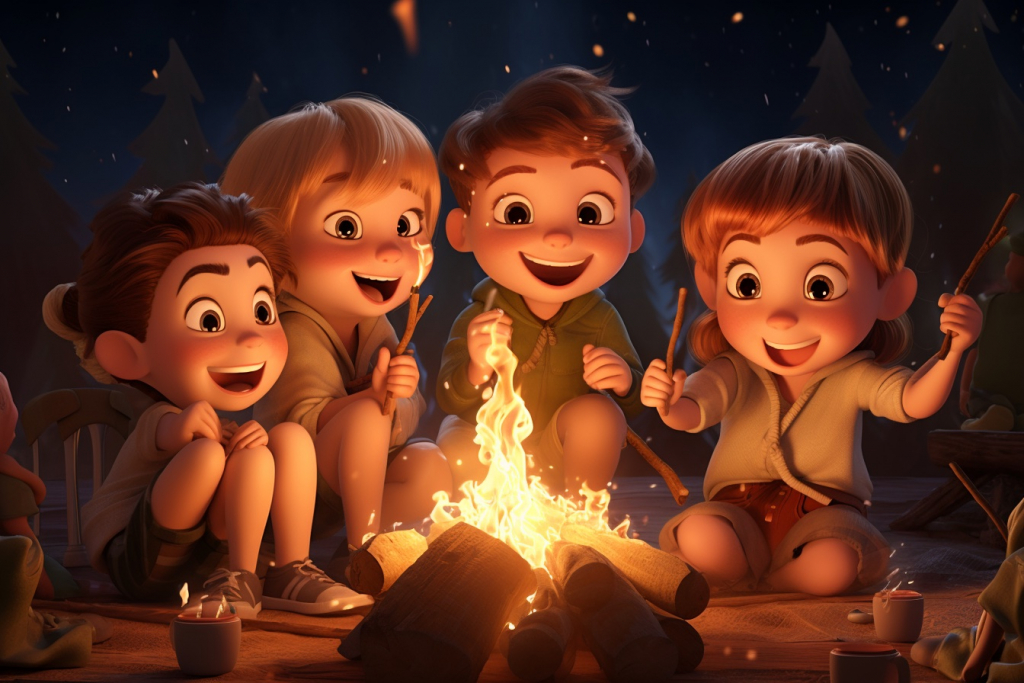
Mrs. Patterson, their teacher, leaned forward and eyed Emma curiously. “Emma, what kept you in the forest for so long?” Emma took a deep breath, ready to share her adventure. But as she let out the first sound, her voice squeaked so high-pitched that it sent shockwaves through the campsite, causing the empty glass bottles nearby to shatter instantly. “Whhhhhhaaat is wrong?” she exclaimed in a voice that sounded like it was straight out of a cartoon.
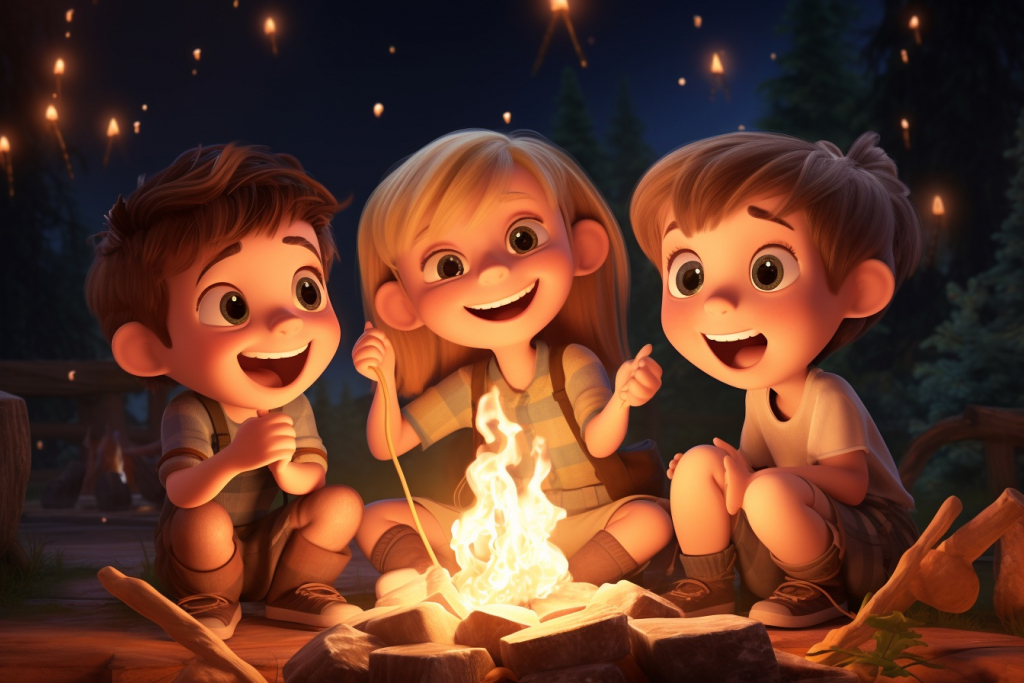
Laughter erupted around the campfire. Some children clutched their stomachs, tears streaming down their faces, while others tried mimicking Emma’s comical new voice.
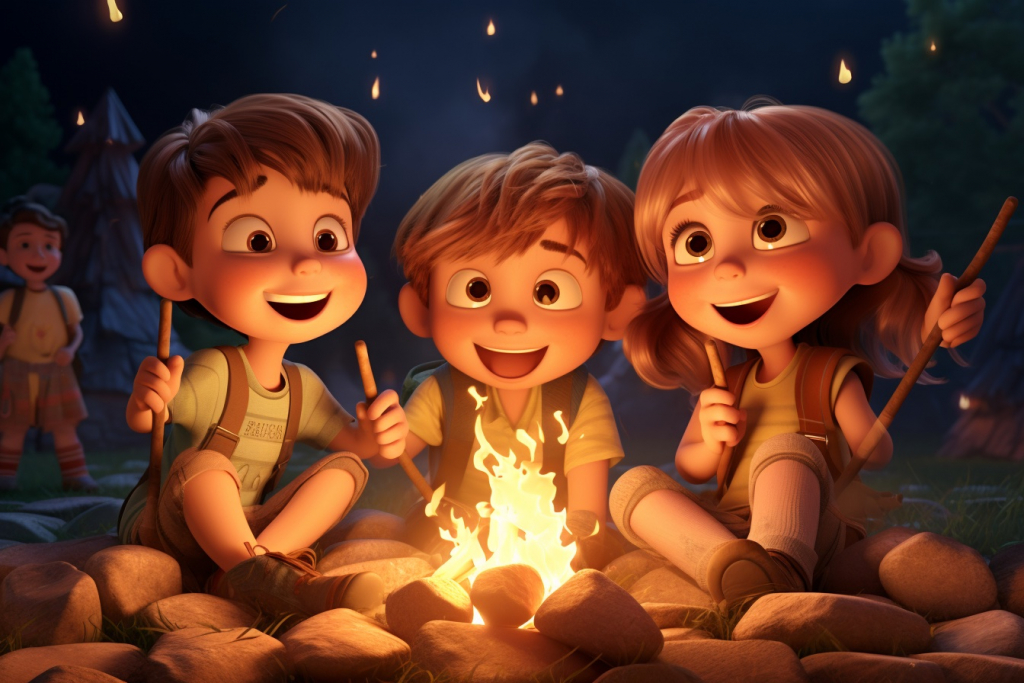
Completely baffled, Emma stared at the broken glass, then at her classmates, and back to Mrs. Patterson. But she didn’t make the connection between her lack of gratitude and the magical bread’s effect.
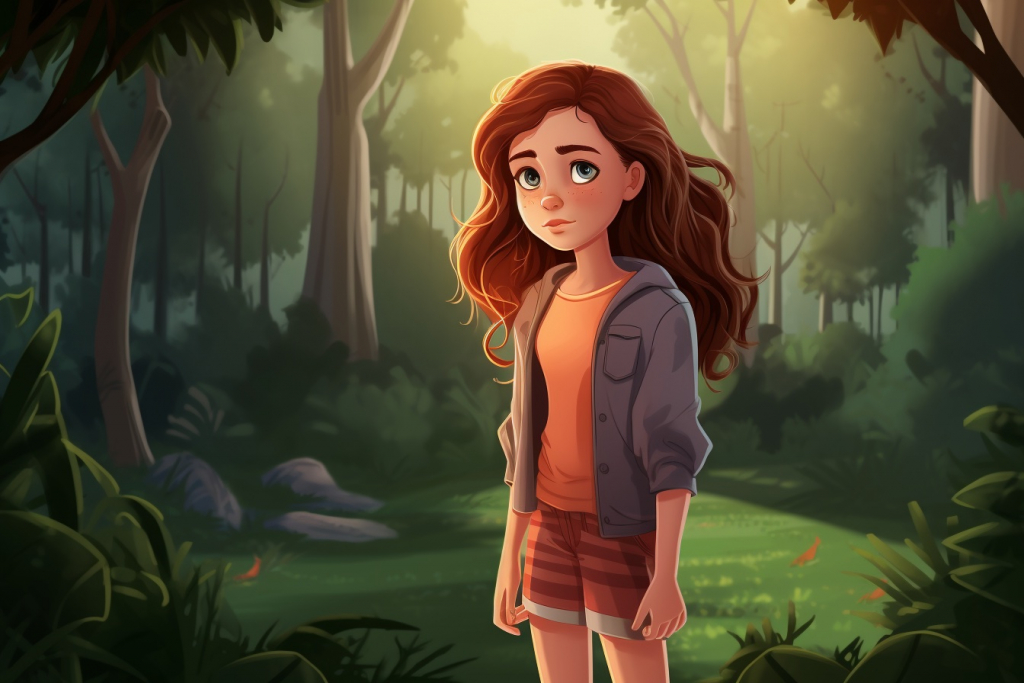
Chapter 3: Melody of the Voice
As darkness enveloped the camp, Emma and Alice, her roommate, occupied the bunk beds inside.
Alice, perched on the top bunk, couldn’t contain her laughter every time Emma spoke. “C’mon, Em, say something again!” she pleaded, her eyes glistening with mischief.
Rolling her eyes, Emma obliged, “I don’t see why this is so funny to you.”
Her words came out in a hilariously high-pitched squeal, reminiscent of a cartoon character on helium. Alice burst into uncontrollable laughter, clutching her pillow tightly. The hilarity of the situation combined with the weariness of the day, making the moment even more hysterical.
Amid the giggles and snorts, Emma tried to speak a few more sentences, but every attempt just evoked more laughter from Alice. It felt like a never-ending comedy skit.
The night progressed, with every muffled sound or rustle outside the tent causing Emma to speak out in her newfound voice, leading to more fits of giggles from the top bunk. But soon, fatigue took over, and the two girls drifted into sleep, with Alice’s intermittent chuckles the only reminder of the evening’s events.
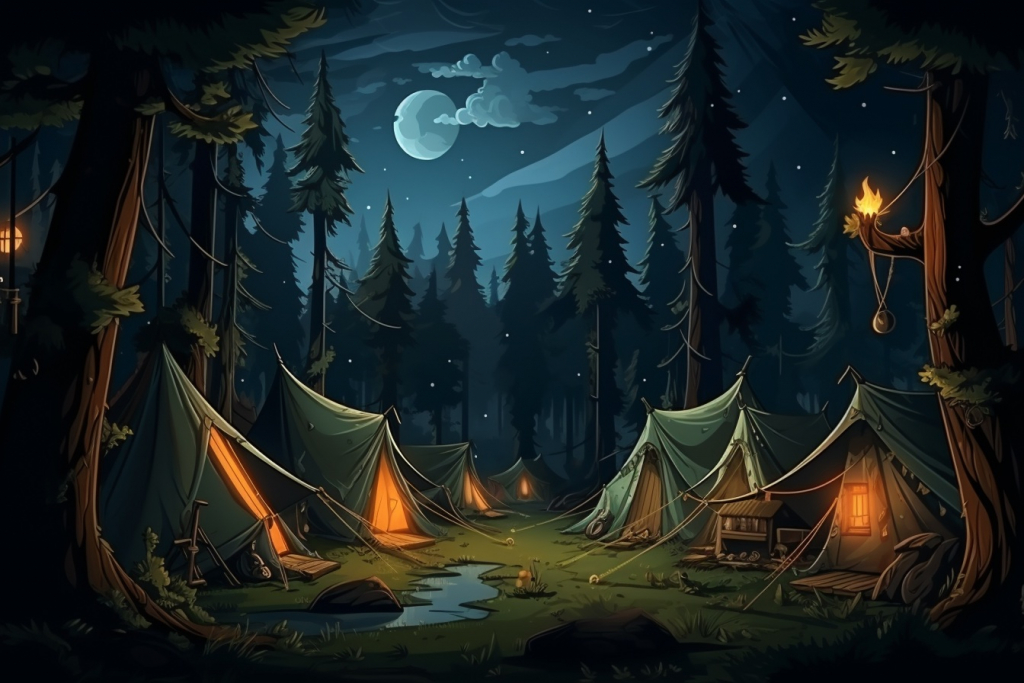
The chirping of the birds announced the dawn of a new day. Campers began stirring, and the scent of pancakes wafted through the camp. The students gathered for breakfast, discussing the day’s hiking plans.
Attempting to blend in and not draw attention to herself, Emma took a seat and tried to stay silent. But the moment she asked for the maple syrup, her squeaky voice was on full display. The kids around her roared with laughter, mimicking her every word.

Feeling utterly embarrassed, Emma’s eyes welled up with tears. She bolted from the table, leaving behind her half-eaten breakfast, and darted into the tent. She buried her face into her sleeping bag, her shoulders shaking with sobs.
A few minutes later, the tent’s zipper gently opened, and Alice walked in, holding a packet of tissues. She sat down next to Emma, wrapping an arm around her. “Hey, it’s going to be okay,” she whispered.
Emma took a tissue, wiping away her tears. Taking a deep breath, she muttered a shaky, “Th-thank you.”
Alice smiled gently, rubbing Emma’s back. “You’re welcome, Emma.”
Suddenly, there was a pause. Emma cleared her throat, “What do you think, when is it gonna be over?”
Alice shrugged, “I don’t know, but—”
Emma interrupted, her eyes wide in realization, “Wait, what? My voice is back?!”
Chapter 4: How does it work?
The two girls stared at each other, bewilderment evident in their expressions. “What just happened?” Alice murmured.
Emma frowned, thinking hard. “I think it’s connected to saying ‘thank you’ but I’m not entirely sure. What if we test it?”
Alice nodded eagerly, “Yeah, let’s see if it works with others.”
They decided to approach Oliver first, the kind boy who had given Emma the roasting stick the previous night. Oliver was seated on a picnic blanket, playing a board game with a group of kids.
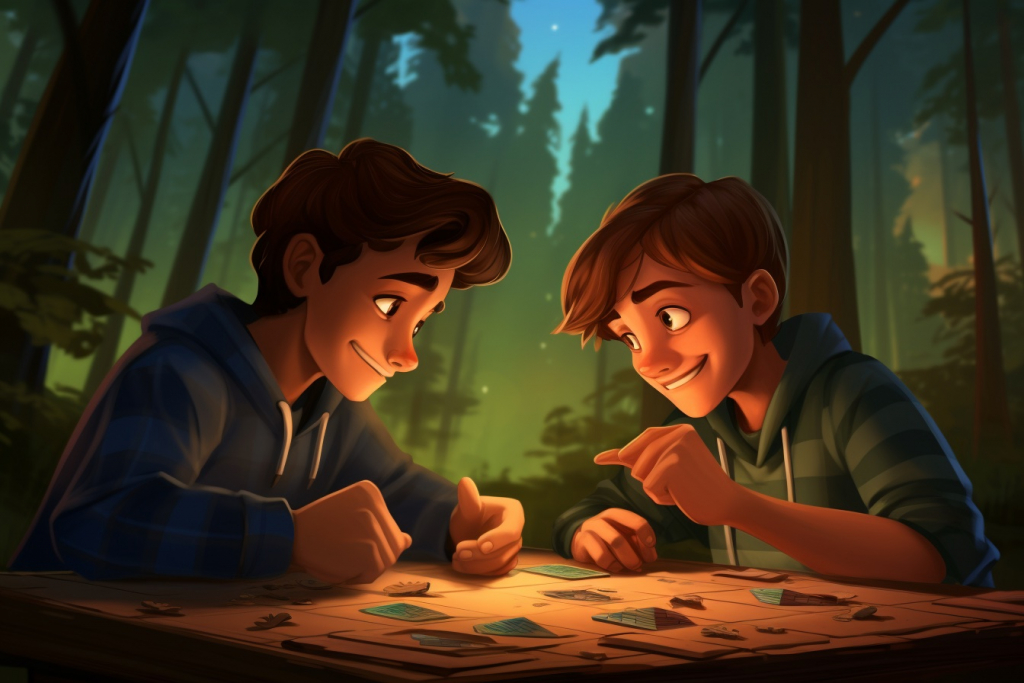
“Hey Oliver,” Emma called out, “Can I borrow that board game later?”
Oliver looked up and smiled, “Sure, Emma. Once we’re done.”
Emma said nothing to him and took the board game from him. She looked expectantly at Alice, who whispered, “Now, try speaking.”
Clearing her throat, Emma exclaimed, “What should I say?”
Her voice was once again so high-pitched that it could have shattered glass. The children around Oliver burst into fits of laughter. Even Oliver couldn’t hold back a chuckle.
Alice doubled over with laughter. “Okay, okay,” she managed between giggles, “Now, try saying ‘thank you’ properly.”
Emma inhaled deeply, trying to ignore her own embarrassment. “Oliver, thank you for letting me borrow the game.”
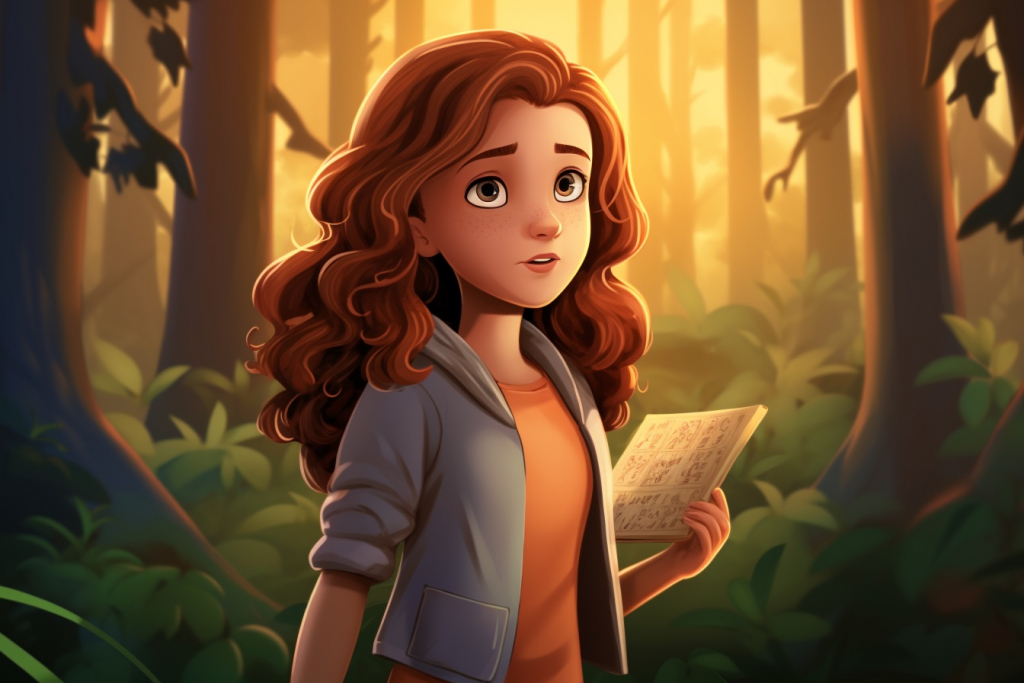
Then she spoke again, her voice sounding perfectly normal, “Did it work?”
Oliver, his eyebrows raised in surprise, replied, “Seems like it.”
Alice clapped her hands in excitement. “So, it’s connected to gratitude! Whenever you forget to say ‘thank you’ or show appreciation, your voice becomes comically squeaky!”
Emma groaned, “Ugh, this is going to be a challenge. But I guess it’s about time I learned the importance of gratitude.”
Alice winked, “Looks like the forest has its own unique way of teaching life lessons.”
Chapter 5: Lessons from the Enchanted Forest
Days turned into weeks, and the magical voice-changing incident became a favorite campfire story. Emma found herself in many hilarious and embarrassing situations whenever she forgot to say “thank you.” It was clear: the old lady’s spell had given her a peculiar lesson in gratitude.
But as time went on, Emma began to change. She didn’t just say “thank you” to avoid the squeaky voice, she started saying it because she genuinely felt gratitude. Every act of kindness, every shared smile, and every helpful hand became a reason for her to express thanks.
One evening, as the camp drew to a close, the kids sat around the campfire, reflecting on their experiences. Mrs. Patterson asked each child to share one important lesson they’d learned during the trip.
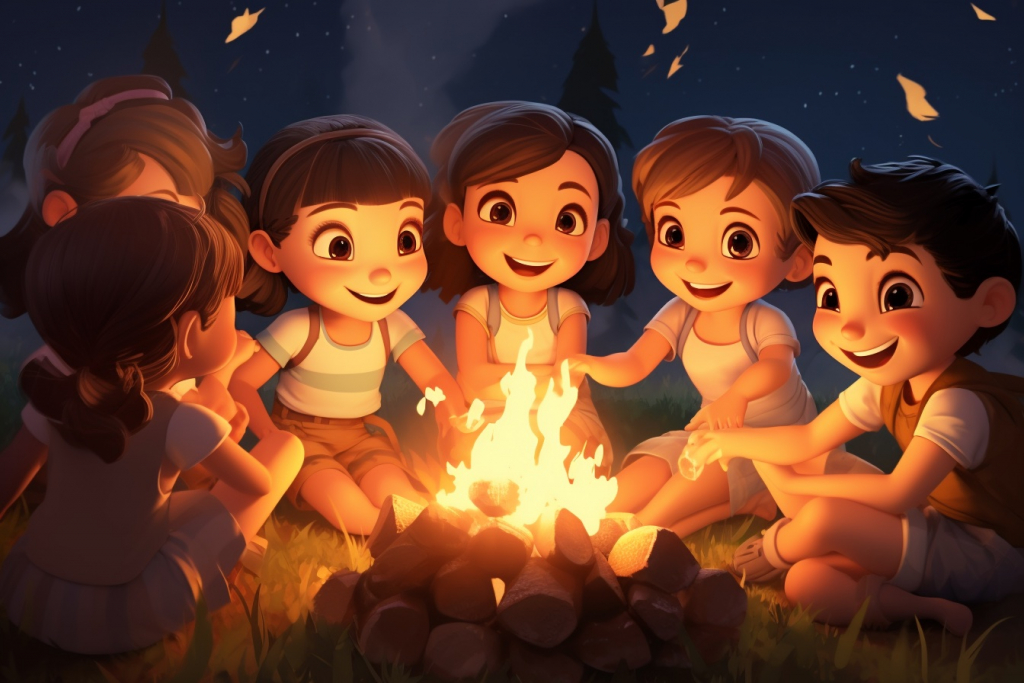
When it was Emma’s turn, she stood up, cleared her throat (a gesture that caused a ripple of laughter among the kids), and said, “I’ve learned the magic of two simple words – ‘thank you.’ It’s not just about politeness or manners; it’s about recognizing and appreciating the goodness in others.”
The children clapped, and Alice gave Emma a proud nod. The mysterious enchantments of the forest had worked in wonderful ways. While some may have thought the forest taught through its flora and fauna, it was clear that its true magic lay in its ability to touch the human heart.
As the kids packed their bags to leave, they took with them memories, laughter, and lessons that would last a lifetime. Emma, with her voice now consistently normal, had a daily reminder of the power of gratitude, and the importance of not taking the small acts of kindness for granted.
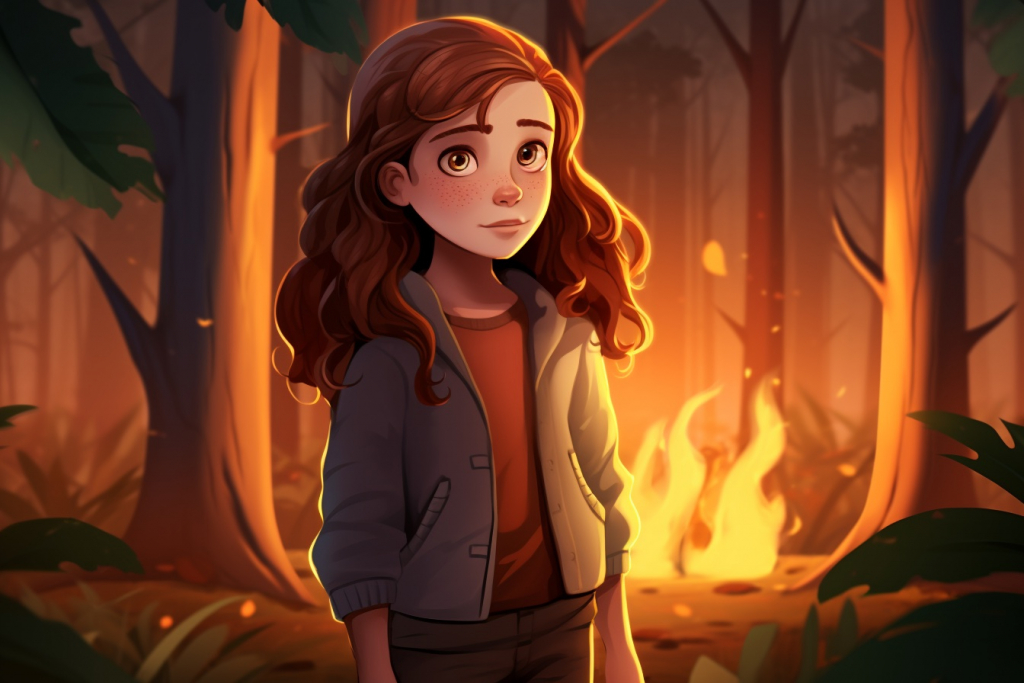
The End.
Moral of the story: Never underestimate the power of gratitude. Saying “thank you” is not just good manners; it’s a way of acknowledging and cherishing the kindness of others



Whispers of the Thankful Thicket